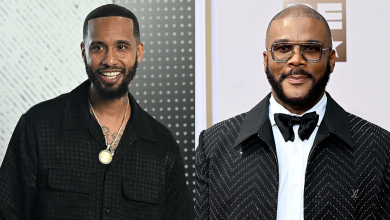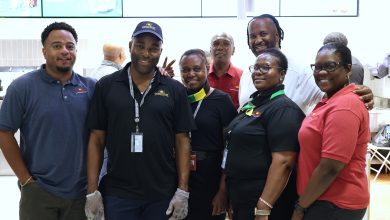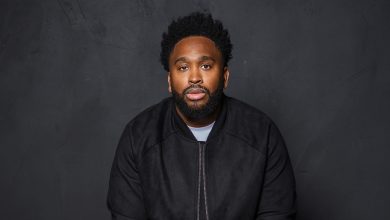Blavity Fest 2025 Boosted Tech With A $5K ‘Idea Hour’ For Community-Centered Innovation
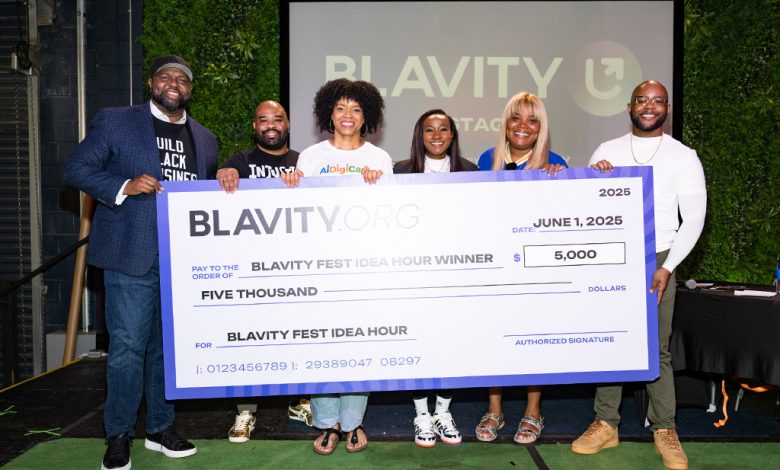
Blavity Fest 2025 lit up Atlanta, GA’s Lee + White complex last weekend in celebration of Black innovation, cultural expression, and collective wealth-building.
Attendees experienced inspiring panel discussions led by experts in entrepreneurship, personal branding, creative development, and financial empowerment, while hands-on workshops offered practical skills in areas including stock trading, book launching, and event planning. The event, held from May 31 to June 1, also featured networking opportunities at community meetups, a Black-owned small business market, and immersive installations designed to spark creativity and connection.
The high-energy, high-stakes, and high-impact success of the 2025 Blavity Fest was no accident, as Atlanta is, for the third consecutive year, the nation’s leading hub for Black-owned businesses, as previously reported by AFROTECH™.
According to a LendingTree analysis, nearly 14,000 — or 11.3% of all businesses in the city — are Black-owned as of 2025.
Purchase your early bird ticket to Blavity Fest 2026 now!
This year, the energy was palpable and soared to new heights with “Idea Hour,” an interactive pitch competition spotlighting community-centered ideas and awarding a $5,000 prize from Blavity.org, the racial equity and social impact organization established by Blavity Inc.’s founders, live on stage.
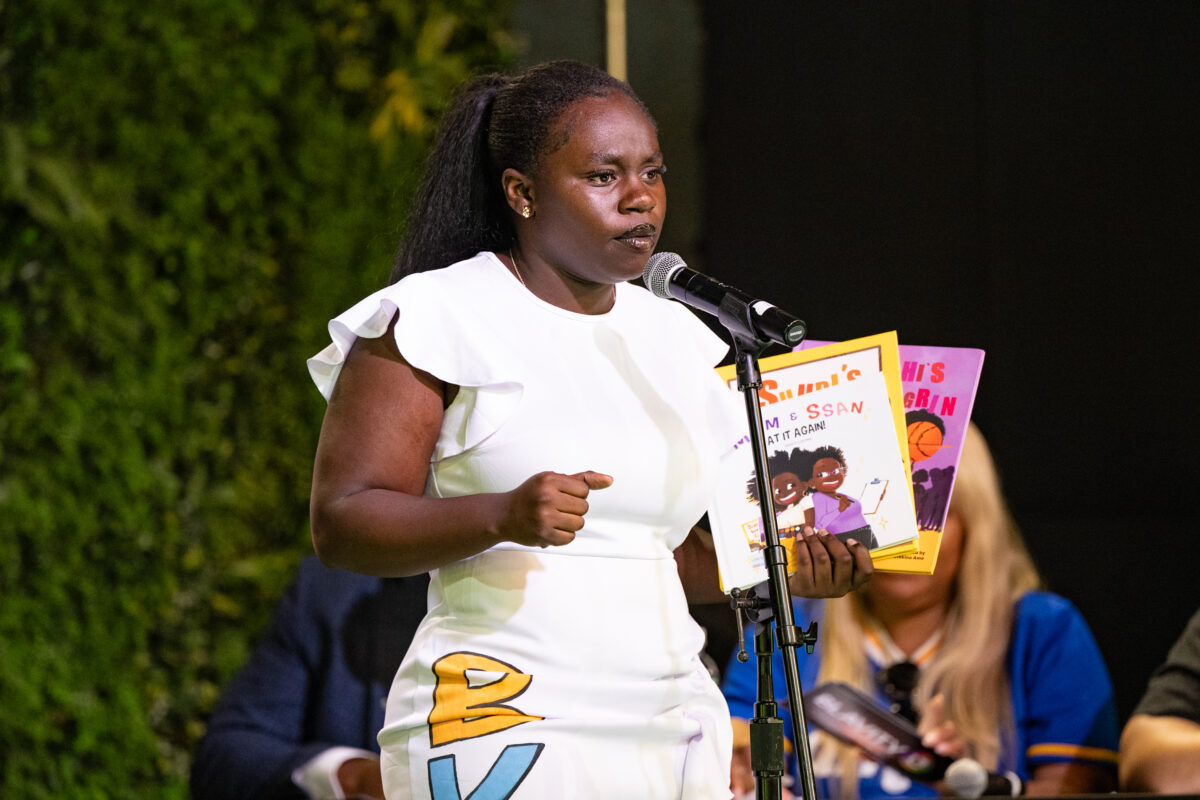
An idea, as defined by Blavity Fest, is any concept, program, or project that uses specific skills to improve the lives of others, especially within the Black community; this can include areas such as coding, storytelling, cooking, education, design, or technology, with an emphasis on culturally rooted, purpose-driven, and actionable ideas.
“Idea Hour is for the people turning their skills into impact — those building solutions, creating access, and showing up for their communities in a tangible way,” said Morgan DeBaun, founder and CEO of Blavity Inc. “This is about recognizing that work and putting real support behind it.”
Here are 10 tech-forward pitches that checked every box the judges were looking for — from community impact to originality and everything in between — proving that the future of innovation is Black, brilliant, and built to change lives.
1. AI For Kids — No Matter Their Zip Code
Founder: Amber Ivey
Offered through AiDigiTales, an edutainment company, the project title speaks for itself — bridging the digital divide by bringing artificial intelligence (AI) education to Black families in Baltimore, MD, through low- to no-tech, hands-on workshops held in trusted community spaces, such as barbershops, churches, and recreation centers.
At a time when Black children are being locked out of the future due to lack of access to basic resources like broadband at home, “AI For Kids — No Matter Their Zip Code” flips the script by using storytelling, card games, and everyday activities to teach children ages 5–12 the fundamentals of AI.
As the world accelerates toward an AI-driven future, this project meets the urgent need for digital equity by meeting kids exactly where they are, using tools they can access.
2. WENITE: Building The Future Of Higher Education
Founder: Anastasia Jackson
WENITE Inc. is changing the game in higher education by transforming Historically Black Colleges and Universities (HBCUs) into SMART Campuses powered by AI, blockchain, and cutting-edge systems. Its mission? To remove barriers that limit opportunity for Black students and institutions and equip them with the necessary tech and tools to define the future.
At Idea Hour, Jackson pitched the Student Innovation Sprint — a tech-driven pilot program where students apply theory to build real-world solutions for their campuses and communities.
WENITE sees institutions as untapped innovation hubs — and it’s ready to lead a new educational revolution to move, build, and serve.
3. Africa Quantum Consortium: Forging Local Strength For Global Impact
Founder: Farai Mazhandu
Africa Quantum Consortium is on a mission with “Quantum Drive Africa” to bring quantum science awareness and education to all 54 African nations in 2025.
The project ensures that Africa’s teachers, communities, and underrepresented youth can actively shape the global quantum revolution as consumers and creators.
Through workshops, school kits, online events, and in-language materials, “Quantum Drive Africa” is breaking down complex science into something both accessible and exciting.
4. Haitians In Tech Open-Source Municipalities
Founder: Whitney Lubin
Tech education meets cultural storytelling. Coding meets civic impact.
This powerful boot camp, provided by the organization Haitians In Tech, teaches Black and underserved youth to code by building real-world, open-source websites for Haitian cities.
The mission? Use artificial intelligence (AI) and web development to equip young people with confidence and in-demand tech skills while giving back to underrepresented communities in today’s digital age. And no — you don’t have to be Haitian to join.
5. Makolaa: Fueling Group Economics For Global Black Brands
Founder: Sika Lawson
Makolaa — a revolutionary platform where commerce and culture collide. Bringing Black excellence and economic power back to Black communities worldwide, this online marketplace is more than just a place to shop.
As Lawson split her time between West African and American cultures, she noticed the same entrepreneurial brilliance and systemic barriers. Her experiences led to the idea of a commerce platform rooted in ownership, access, and intentional circulation of Black dollars.
Makolaa, which means “the child who brings wealth home” in the Yoruba tribe, is reportedly the first global marketplace that uses individual digital storefronts to connect buyers directly with Black creators, makers, and entrepreneurs — no matter where they are in the world.
Makolaa also provides entrepreneurs with a range of resources, tools, and training — all designed to improve financial and business literacy, foster sustainable growth, and fuel collective wealth-building. At its core, the platform is about more than sales; it’s about economic empowerment and long-term advancement for Black-owned businesses and the communities they serve.
6. Breakin’ Bread
Founders: Anscia Terelle Brown and Alexis Hall
Breakin’ Bread is a curated digital platform where culture and collaboration set the tone for creativity to become currency — built exclusively for Black creatives.
The platform aims to close the equity gap by providing the infrastructure, exposure, and economic opportunity Black creatives need to thrive. It is structured around three core pillars:
- Creative Community: Exclusive events, workshops, and virtual meetups that foster authentic collaboration and growth.
- Business Tools: An all-in-one digital suite for managing contracts, payments, proposals, and client communication — so creatives can focus on their craft.
- The Marketplace: A tiered matchmaking system connecting vetted Black talent with businesses seeking excellence in design, media, strategy, culinary arts, cultural production, and more.
Together with Oscar David Flores de Valgaz, a licensed wealth manager and strategic finance consultant, and Dominique Jones, a project manager with a background in operations, Brown and Hall are on a mission to break systemic barriers — and ensure Black brilliance is supported and compensated at every stage.
7. Creative Education Playground
Founder: Cassandra Hamer
Creative Playground is the core of Design Elementary — a creative education initiative for Pre-K through 5th grade that combines imagination, technology, and innovation.
Designed to bridge the gap between core academics and creative thinking, the program weaves graphic design, media, and digital tools into everyday lessons.
Through school visits, interactive workshops, and hands-on workbooks, Creative Playground helps young learners build critical thinking, problem-solving, and creative confidence — all in a playful, structured environment that empowers kids to turn ideas into action and prepare for a tech-driven future.
Hamer is in the process of developing a custom SaaS platform for educators, families, and students. Key features will include interactive learning modules, digital portfolios, classroom-ready teacher tools, and real-time feedback and collaboration features.
8. HerAI Empowerment Initiative: Accelerating Women’s Business Success Through AI
Founder: Juperi Johnson
HerAI Ventures is on a mission to empower women entrepreneurs — especially those from underserved and overlooked communities — with the AI and digital tools they need to start, grow, and scale their businesses — no tech background required.
Through hands-on workshops, accessible digital products, and a supportive monthly membership, HerAI closes the gap between ambition and access, turning ideas into action and building legacies along the way.
9. ‘Robotic Adventures: A Journey Beyond Imagination’ Book And The HydraBot
Founder: Rich Gilliam
It’s no secret that Black and Hispanic children — especially those from underrepresented backgrounds — often lack access and exposure to STEM (science, technology, engineering, and math). It’s a gap Gilliam set out to close with the STEM Plug education platform. He has also created “Robotic Adventures,” an engaging STEM book series, and HydraBot, an interactive toy, as learning tools.
Together, the products help kids see themselves as creators, problem-solvers, and future leaders in STEM by making complex concepts personal and accessible. The HydraBot allows students to physically build, explore, and apply STEM principles in their everyday lives.
The bigger mission? To inspire and equip 8 million young innovators with the tools to not just dream bigger but build bigger — starting today and scaling through 2030.
10. Youth Entrepreneurship Accelerator
Founder: Nandi Edouard
The Youth Entrepreneurship Accelerator is planting the seeds of economic empowerment in Atlanta, GA — providing Black middle schoolers with the tools, mentorship, and seed funding to launch their own micro-businesses while solving real community challenges.
Over 12 weeks, 20 students will go from consumers to creators and builders, receiving support from successful Black entrepreneurs to identify neighborhood needs and design solutions through STREAM principles (science, technology, reading, engineering, arts, and math).
Along the way, they’ll gain entrepreneurial skills such as creativity, resilience, financial literacy, and communication — tools they’ll benefit from in business and beyond.
